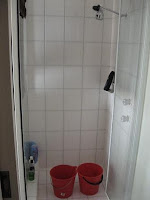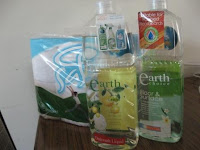I realised as I began writing this blog that there were actually quite a few things we had already instigated prior to beginning the ‘one act a month’ commitment. Here is the list of what I can think of that we were already doing at our house to try living more sustainably:
- water saver shower heads in both showers (I was worried they would make the shower feel pathetic, but you can still get a good ‘big shower’ feel so I am happy to recommend them to others)
- buckets in shower to catch as much water as possible, especially the few litres that runs out cold before the hot water gets there (Initially we were using this water to flush the toilet, but the toilet cistern was getting pretty gunky with the soap etc of the shower water, so now we just use it on the garden.)
- toilet flushing limitations (Without being too detailed, you don’t need to flush every time – and certainly not with the full 10L of the cistern)
- front-loader low water/ moderate energy washing machine
- no clothes dryer (even super absorbent bamboo nappies dry within about 4 hours in summer and two days in winter – less if there is a heater on)
- green energy (yes I know the actual electricity we use comes off the grid same as my neighbours’, but we pay the extra to ensure the amount of electricity we use is somewhere put into the grid from renewable sources. Its not ideal but it’s a start)
- energy-saver light globes in the two main living areas

- shade cloth to rear area, to shelter living area windows from afternoon summer sun
- minimal air conditioner use – only on REALLY hot days, and even then only for a few hours in the afternoon (in hot weather we close the blinds/ curtains/ doors/ windows to keep out the sun, open everything at night to get cross-ventilation, and use fans for most of our cooling, all of which dramatically reduces the house’s temperature without using the energy-guzzling split-cycle air conditioner.)
- minimal heater use - only on REALLY cold days, and then only for a few hours in the evening (In cold weather we put on more clothes, have rugs on the tiles and wear ugg boots. We don’t heat bedrooms at night, just have lots of blankets and snuggle up. I was hoping ugg boots might qualify as a sustainable measure for funding support, as they make such a difference to my use of the heater, but no such luck)
- timer set on the oil fin heater in Eva’s room so that it runs only part of the night (We bought a 5-fin oil heater when Eva was due, as it was late winter and we needed some way to have a warm space ready for night time feeds and nappy changes. The timer was set so that the heater turned on and off every half hour, which took the chill off the room sufficiently. After about 6 weeks Eva didn’t need night time attention and the weather was getting warmer, so both the heater and the time were retired after only a short run)
- air conditioner set to 27°C in summer and heater to 19°C in winter (Every one degree higher (winter) or lower (summer) a heating/ cooling system is set uses 10 percent more energy, so we aim to take the edge off the temperature without making it super warm or cold)
- lights off during the day, or when we are not using a room at night (It was only when a house guest was here recently and left her bedroom light on all the time that it occurred to me that not everyone turns lights off)
- one car
- using public transport or riding bike for work and uni; walking to anything within about 20 minutes (one way) and occasionally longer trips, like the 35-40min walk to the nearest café strip/ shopping area, when we don’t need to carry too much (mostly – it’s a bit trickier with a baby, but when she can sit up properly we’ll look at a seat for her on my bike)

- enviro-friendly dishwashing and floor scrubbing liquid (We also tried toilet enviro-friendly toilet cleaner but it was useless)
- using recycled toilet paper and paper towels
- using recycled paper for the computer – both re-using scrap paper for drafts and purchasing recycled paper for good copies
- ensuring that we put everything possible into the recycling bin supplied by the council, not into the general rubbish bin
- minimal alfoil use (I was astonished to discover the amount of electricity required to produce aluminium. Alcoa uses 40% of Western Australia’s electricity! That’s outrageous! So, we still have alfoil in the cupboard, but we have found that a plate or tray over the dish usually works just as well in the oven, and gladwrap or baking paper works for most cold purposes)
- free-range eggs and chicken
- reducing lamb, beef and pork to only occasional mince or sausages, and choosing kangaroo or goat for other dishes (Australian red meat is not produced using as much energy as in Europe or North America, but it is still not the most sustainable land use – kangaroo and goat are much better)
- fair trade coffee and some fair trade tea – or Australian-grown/ made if fair trade is not available (but I confess to not buying fair trade herbal teas most of the time, and I am mostly a herbal tea drinker)
- careful seafood choices, especially no tuna unless specified as yellowfin tuna (I was appalled to discover that current rates of commercial fishing mean that within my lifetime wild fish stocks will die out completely. We try to base our choices on the seafood shopping guide. Tuna, being at the top of the food chain, are one of the worst fish to eat. I love tuna, especially those little sandwich tins, so cutting tuna out of our diet was challenging, and I confess I sometimes fall off the wagon when the little tins are 99c…)
- cloth shopping bags, and some attempt to make purchases, food in particular, that have less packaging
- worm farm
- vegies instead of lawn in much of our front courtyard

Putting together this list has lifted my spirits considerably. Drawn into one place it appears we are actually doing quite a lot, even if each thing feels small.
We also attempt to build positive relationships with our neighbours. I don’t know quite how that fits with the list above, but to me it feels like a significant aspect of sustainable living to challenge the isolationist suburban box mentality that dominates much of our culture. We try to make our home a place of hospitality – having a spare bed and welcoming guests, inviting neighbours to dinner, making an effort to chat to people in the street rather than walk past, offering our living space as venue for various group events, attempting to be generous. Small things, I know, but for me it is not sustainable to decrease water and energy usage, reduce our waste, make considered choices about what and how we consume but live isolated from those around us. Christopher Jamieson, applying the wisdom of St Benedict for modern life, says ‘we get to heaven together or not at all’. It’s a tough call, but I believe the only real way to get to any sort of ‘heaven’, including the heaven of sharing the planet well, is to travel together as community.
We also attempt to build positive relationships with our neighbours. I don’t know quite how that fits with the list above, but to me it feels like a significant aspect of sustainable living to challenge the isolationist suburban box mentality that dominates much of our culture. We try to make our home a place of hospitality – having a spare bed and welcoming guests, inviting neighbours to dinner, making an effort to chat to people in the street rather than walk past, offering our living space as venue for various group events, attempting to be generous. Small things, I know, but for me it is not sustainable to decrease water and energy usage, reduce our waste, make considered choices about what and how we consume but live isolated from those around us. Christopher Jamieson, applying the wisdom of St Benedict for modern life, says ‘we get to heaven together or not at all’. It’s a tough call, but I believe the only real way to get to any sort of ‘heaven’, including the heaven of sharing the planet well, is to travel together as community.
No comments:
Post a Comment